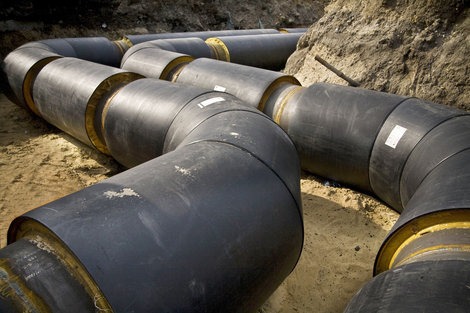
Two new developments in the heating sector look set to increase the number of district heating schemes in the UK. However, there is a fundamental problem with regard to heat loss from such networks which needs to be addressed according to Mark Whettall of CPV Ltd.
The Heat Networks Delivery Unit was created by the Department of Energy and Climate Change (DECC) to provide funding and expertise to local authorities engaged in assessing opportunities for heat networks. A £6 million grant funding programme has also been established to help local authorities in England and Wales such schemes.
“It's all about the opportunity for system developers to minimise the heat lost through the pipe system's insulation” Mr Whettall said. “The EN 253 standards for bonded pre-insulated pipe systems actually includes three, different thicknesses of polyurethane foam insulation that are commonly available, but the vast majority of designers opt for the standard level - ignoring the better-performing Series Two and Series Three with their increased levels of insulation. With most developers focused on keeping the capital costs as low as possible, particularly when there's a competitive tendering situation, many are ignoring the opportunity to reduce heat losses and thereby missing out on significant financial and environmental benefits throughout a system's operational life.”
To illustrate this point, CPV Ltd has presented an example scenario involving a 5,000-metre long network (flow and return) consisting of DN150mm steel pre-insulated pipes circulating hot water at a flow temperature of 100°C. If fuelled by a natural-gas-fired boiler, constantly operating all-year-round, the system, with standard insulation over its nominal 30-year life, will lose heat to the equivalent of around £3.65 million's-worth of gas. By spending around £40,000 extra at the time of installation in order to upgrade the pipe system's insulation thickness to Series Two, the cost of the heat lost would be reduced by some £1.2million - also saving 5,091 tonnes of CO2 from being emitted.
“It's also worth noting that the operators of the systems are not losing just the cost of the fuel - but the cost of the heat sale if it's a commercially-based utility” continued Whettall. “So the savings figure of £1.2million will rise significantly - I'd expect this to at least be doubled to around £2.4million. I realise that the cost of installation will increase marginally, largely due to the need to excavate a slightly larger trench to fit the increased insulation, but the step-up from Series 1 DN150mm steel only adds 65mm to the overall diameter - so it's negligible.”
Mr Whettall added that the whole issue of least-cost tendering is not just limited to the topic of heat loss. Its effects are far reaching and it is a problem that is already compromising the long-term reliability of district heating networks. Whettall has previously voiced concerns at the urgent need for the UK's district heating sector to put in place a cohesive set of quality standards covering all aspects of a network's design, construction, operation and maintenance. He now believes that network owners and developers really do need to get behind this initiative.
“There will be resistance by some organisations” he said, “but until we pull together collectively and agree a framework on which best practice can be defined and therefore applied, we'll be risking the future growth of the sector and damage the potential for helping solving the challenges presented for the decarbonisation of heat in the UK. A working group must be established to progress this which will need to include not only DECC and its new Heat Networks Delivery Unit (HNDU), but other bodies such as CIBSE, the Combined Heat and Power Association and the Energy and Utilities Alliance to name a few.”
Whettall maintains that commercial interests should not be allowed to water down best practice at such an important time in the development of strategy for rolling out heat networks. He believes that whatever is created, it's critical that it is done and done quickly.
For additional information:

